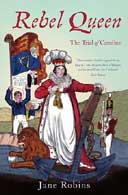
Rebel Queen: The Trial of Caroline
by Jane Robins
370pp, Simon & Schuster, £20
A marriage has been arranged that cannot possibly come to any good. He is vain, arrogant, domineering and quite possibly married already. She's naive, open-hearted and given to blurting out whatever comes into her head. She's also not very pretty. When the bridegroom gets his first sight of her, he feels faint and calls for brandy. She's shaken by his unloving behaviour and alarmed that he's so fat. The marriage, three days later, is not a happy occasion; nor is the wedding night. Never again, the new husband vows; but once is enough apparently, for the lady is found to be pregnant. It's a situation which at any level of life would take some disentangling, but the complication here is that he is the Prince of Wales, and will one day be George IV; while she, Caroline, Princess of Brunswick, is absolutely determined, however much her husband ill-uses her, that she'll be his queen.
It's the kind of misalliance that some have made into operas and many more into soap operas and the story, as Jane Robins tells it, has ripe elements of both. Soon the two are living apart, she with a rival court of her own and no shortage of male admirers. Gossip abounds. The child of the marriage, Princess Charlotte, grows up, is married herself to a German prince, is found to her mother's delight to be pregnant, endures a 50-hour labour, only for her child to be stillborn; next day, she too is dead, just short of her 22nd birthday. (Had she lived we would never have had Queen Victoria.) Caroline at this stage is living, indiscreetly as ever, abroad. What makes her resolve to return is the death of George III and her husband's accession. The new king is determined to stop her. He's had evidence collected to build a case that Caroline is an adultress. The court chosen to test that contention is the House of Lords, before which the government places a bill to strip Caroline of her titles and end the marriage.
This episode is the crux of the story and the stirring, lavish and brilliant centrepiece of Robins's book. Officially, the trial takes place in cloistered surroundings before a narrow and unrepresentative assembly of aristocrats. In fact, the whole country's in on it. The king is vastly unpopular; the queen believes with good reason that, outside the ranks of a stuffy and fearful establishment, England is on her side. The Lords are convinced: but only by a narrow majority, thin enough to persuade the prime minister, Liverpool, that the bill cannot pass in the Commons. He's also aware that if the process continues, a great deal more dirt about George is sure to emerge (a calculation later vindicated when Caroline's principal champion at the trial, the brilliant, copiously gifted and hopelessly unreliable lawyer and politician Lord Brougham, disclosed in his memoirs that he'd been ready to prove that George was already married to his mistress Maria FitzHerbert; FitzHerbert being a Catholic, that meant that George would have had to forfeit his throne).
So Liverpool, to the king's fury, abandons the bill. But now the coronation is due. Caroline is determined that she will be crowned alongside her husband: George is determined she won't. She turns up, uninvited: the doors are barred to her; she gives up the fight, soon after takes her to bed, and 19 days later is dead. There are rumours that she may have been poisoned.
As a proof that fact is sometimes even richer than fiction this tale would take some beating, and that's exactly the way that Robins handles it. She doesn't needlessly decorate, overload, or drench her proceedings in phony drama. Her enjoyment of this extraordinary story is tempered by careful scholarship: wide reading, judicious use of her sources, and a skewering eye for a telling quote. Her publishers have even allowed her footnotes. Quite apart from George and Caroline, outsize characters - especially Brougham, but Cobbett too, and his fellow pamphleteers, busy redesigning the queen as a radical icon, feeding fears that revolution is on the way - light up her pages. The influence of public opinion - mobilised here, Robins suggests, as never before - is inflamed by a press whose brazenness and taste for the scurrilous makes our present-day tabloids seem almost monastic.
· David McKie's Jabez: The Rise and Fall of a Victorian Rogue is published by Atlantic

